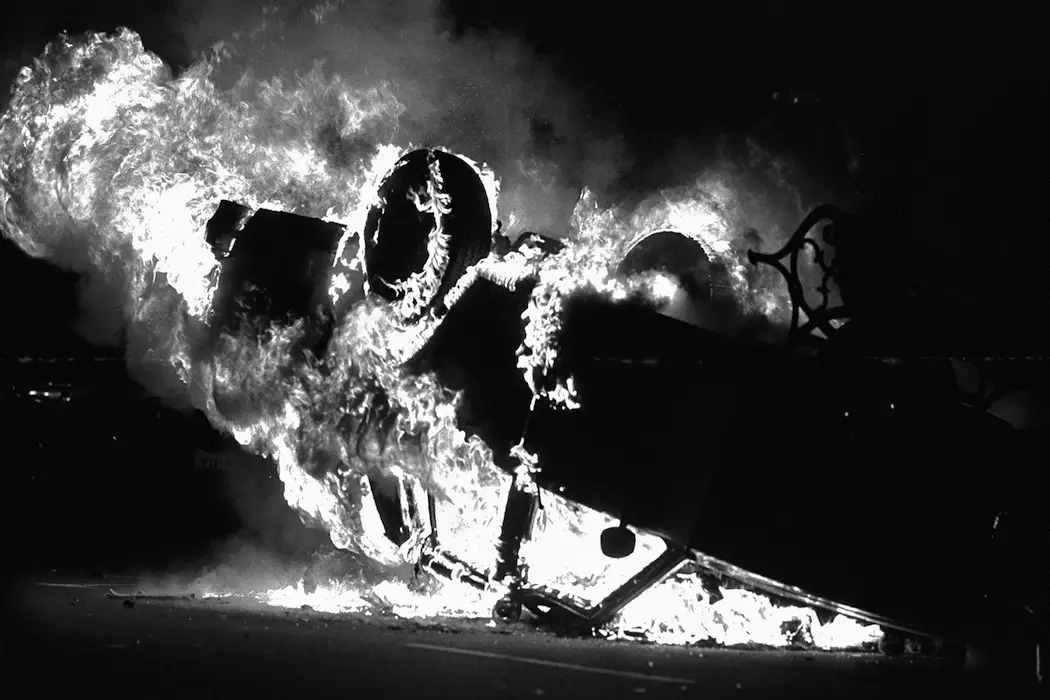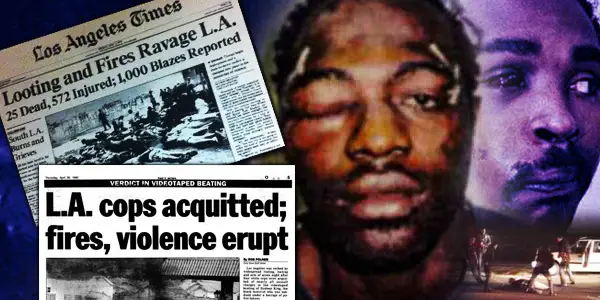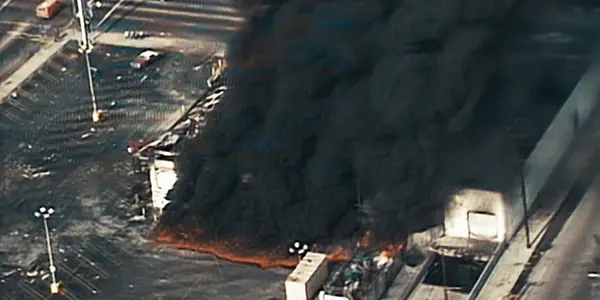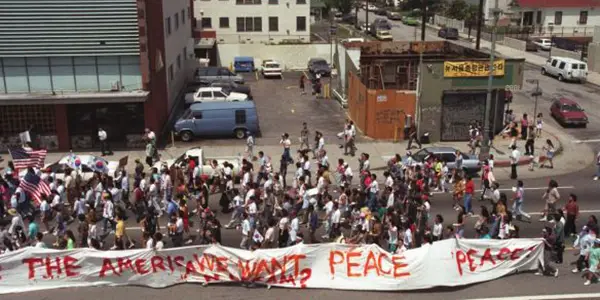LA 92: A Tragic Moebius Strip

Arlin is an all-around film person in Oakland, CA. He…
In a time where footage of police assault and murder is a regular occurrence, we often find ourselves taking stock in our society. In today’s ‘thinkpiece’ era, it seems as though we live in a state of constant self-reflection. Yet we still have the exact same systemic problems that existed in an era with absolutely no accountability, however disrupted by the democratization of video technology. In their landmark new documentary, T.J. Martin and Daniel Lindsay take us back to the beginning stages of what would lead to an intense national awareness of the institutional assault of Black lives.
Constructed entirely from archival materials, LA 92 is a tour de force piece of experiential non-fiction – transporting the viewer to a host of Los Angeles area locations and people who would come define that year in the city’s history. While the notorious riots are at the film’s center, LA 92 is chiefly concerned with providing the essential context for why they happened – cyclically rooted in a long history of violence and looking as far back as the Watts riots of ’65. Through a thorough presentation of primary sources, the film examines what happens when a community abused for decades by those supposedly tasked with keeping it safe reaches its limit.
Time & Place

From the first lines of dialogue, you’re smacked in the face with the institutional racism that has pervaded police forces since their inception. Recordings of radio calls where the n-word is official parlance, spoken with the same banality as one might describe a jaywalker, demonstrate the toxic mindset of of those in police work, leading to incidents like those that would set the stage for the ’92 riots.
I’m talking of course about the infamous Rodney King beating upon which, along with the subsequent trial, the early parts of the film spend a great deal of time so as to best frame what is to follow. But as what I’m sure will be the definitive documentary on this historical moment, the film is sure to go beyond that one incident, which was unique only in that it was captured on video. The film also looks at the miscarriage of justice that followed the murder of Latasha Harlins, but beyond those two high profile instances, through interviews with the public it’s made clear that such tragedies are the rule rather than the exception. Anger around police brutality had been percolating for decades and these incidents represented their boiling over into the public discourse.

That anger is so effectively conveyed through the assembled footage (if this film doesn’t receive a best editing nomination then there’s no justice in the world), but also aided by this approach is the film’s conveyance of time. We frequently see newscasters before they go live, waiting for their signal to engage with the public. It would be so easy and natural to just cut from major event to major event, but LA 92 regularly takes moments to breathe – if not to understand, then merely to absorb. The ubiquity of the coverage also speaks to how closely viewed and widely reported these events were, and consequently implies the massive effect they had on the American populace and discourse.
Accompanied by a classical score, the film often feels like a requiem; mourning for black lives, for public trust, for the modern day that still struggles with the same issues. Through exclusive engagement with primary sources, you acutely experience the immediacy of the events as they transpired. In a film that uses a more standard interview approach (such as last year’s Oscar winner OJ: Made in America), you have decades passing between when events took place and their being discussed in the film, resulting in a more analytical, contemplative and intellectual presentation. With LA 92, however, there’s no time to process.Eeverything is happening all at once everywhere you look; there’s so much more feeling than thinking going on here. I felt so immersed in this historical moment that after the film was over I initially had trouble shaking it off – expecting perhaps to pass a flaming palm tree on my walk home.
No End In Sight

It’s remarkable how Lindsay and Martin were able to take from all these disparate sources and build such a clear narrative through line. The VHS quality of the television recordings helps to aesthetically unify the film, bringing the work of countless broadcasters under one umbrella and furthering the sense of the time.
LA 92 is a beautifully constructed documentary without almost anything beautiful in it. You’ll have to watch the Rodney King video yet again, not to mention the trucker and the brick from the first day of rioting. But even though viewers are likely to have seen this footage countless times, in LA 92 it serves a very clear purpose: to establish the brutality wrought upon the city in the early 90s and an effort to present the events such violence caused as holistically as possible. The scope of the tragedy is just so deep, I found myself fighting back tears.
And that’s really what’s being documented here: tragedy, through and through, wrought upon the public by the police, the courts, the federal government and eventually individual citizens of LA. Why is the latter example the only one at which mainstream anger is expressed? Only the “brutality of the mob” warranted attention from then President Bush. What about the institutions that for years created the conditions that made such civic destruction an all-too predictable outcome? As long as the rebukes of those in power are aimed at those left so voiceless that rioting is the only way to be heard, as it seems like they will be in the near-term, this sad cycle will only continue its loop.
By the end of the film, you realize LA 92 isn’t just the history of one geographical moment, but the history of America. As one bystander interviewed by news crews stated, “I don’t think it’ll ever stop, really.” 25 years later, and he seems to have been painfully prescient, leaving us right back where we started.
What did you think of LA 92? Leave your comments down below!
LA 92 expands its theatrical run nationally today.
Does content like this matter to you?
Become a Member and support film journalism. Unlock access to all of Film Inquiry`s great articles. Join a community of like-minded readers who are passionate about cinema - get access to our private members Network, give back to independent filmmakers, and more.
Arlin is an all-around film person in Oakland, CA. He received his BA in Film Studies in 2010, is a documentary distributor and filmmaker, and runs Drunken Film Fest Oakland. He rarely dreams, but the most frequent ones are the ones where it's finals and he hasn't been to class all semester. He hopes one day that the world recognizes the many values of the siesta system.













